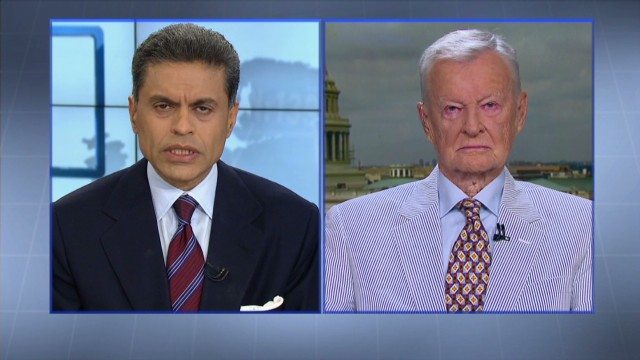 By Zbigniew Brzezinski and Stephen Solarz
By Zbigniew Brzezinski and Stephen Solarz
More than three decades ago, Israeli statesman Moshe Dayan, speaking about an Egyptian town that controlled Israel’s only outlet to the Red Sea, declared that he would rather have Sharm el-Sheikh without peace than peace without Sharm el-Sheikh. Had his views prevailed, Israel and Egypt would still be in a state of war. Today, Prime Minister Binyamin Netanyahu, with his pronouncements about the eternal and undivided capital of Israel, is conveying an updated version of Dayan’s credo — that he would rather have all of Jerusalem without peace than peace without all of Jerusalem.
This is unfortunate, because a comprehensive peace agreement is in the interest of all parties. It is in the U.S. national interest because the occupation of the West Bank and the enforced isolation of the Gaza Strip increases Muslim resentment toward the United States, making it harder for the Obama administration to pursue its diplomatic and military objectives in the region. Peace is in the interest of Israel; its own defense minister, Ehud Barak, recently said that the absence of a two-state solution is the greatest threat to Israel’s future, greater even than an Iranian bomb. And an agreement is in the interest of the Palestinians, who deserve to live in peace and with the dignity of statehood.
However, a routine unveiling of a U.S. peace proposal, as is reportedly under consideration, will not suffice. Only a bold and dramatic gesture in a historically significant setting can generate the political and psychological momentum needed for a major breakthrough. Anwar Sadat’s courageous journey to Jerusalem three decades ago accomplished just that, paving the way for the Camp David accords between Israel and Egypt.
Similarly, President Obama should travel to the Knesset in Jerusalem and the Palestinian Legislative Council in Ramallah to call upon both sides to negotiate a final status agreement based on a specific framework for peace. He should do so in the company of Arab leaders and members of the Quartet, the diplomatic grouping of the United States, Russia, the European Union and the United Nations that is involved in the peace process. A subsequent speech by Obama in Jerusalem’s Old City, addressed to all the people in the region and evocative of his Cairo speech to the Muslim world in June 2009, could be the culminating event in this journey for peace.
Such an effort would play to Obama’s strengths: He personalizes politics and seeks to exploit rhetoric and dramatic settings to shatter impasses, project a compelling vision of the future and infuse confidence in his audience.
The basic outlines of a durable and comprehensive peace plan that Obama could propose are known to all:
First, a solution to the refugee problem involving compensation and resettlement in the Palestinian state but not in Israel. This is a bitter pill for the Palestinians, but Israel cannot be expected to commit political suicide for the sake of peace.
Second, genuine sharing of Jerusalem as the capital of each state, and some international arrangement for the Old City. This is a bitter pill for the Israelis, for it means accepting that the Arab neighborhoods of East Jerusalem will become the capital of Palestine.
Third, a territorial settlement based on the 1967 borders, with mutual and equal adjustments to allow the incorporation of the largest West Bank settlements into Israel.
And fourth, a demilitarized Palestinian state with U.S. or NATO troops along the Jordan River to provide Israel greater security.
Most of these parameters have been endorsed in the Arab peace plan of 2002 and by the Quartet. And the essential elements have also been embraced by Barak and another former Israeli prime minister, Ehud Olmert.
For the Israelis, who are skeptical about the willingness of the Palestinians and Arabs to make peace with them, such a bold initiative by Obama would provide a dramatic demonstration of the prospects for real peace, making it easier for Israel’s political leadership to make the necessary compromises.
For the Palestinians, it would provide political cover to accept a resolution precluding the return of any appreciable number of refugees to Israel. Palestinian leaders surely know that no peace agreement will be possible without forgoing what many of their people have come to regard as a sacred principle: the right of return. The leadership can only make such a shift in the context of an overall pact that creates a viable Palestinian state with East Jerusalem as its capital — and that is supported by other Arab countries.
For the Arabs, it would legitimize their own diplomatic initiative, embodied in the peace plan put forward by the Arab League eight years ago. Moreover, their support for Obama in the effort would be a vital contribution to the resolution of the conflict.
Finally, for Obama himself, such a move would be a diplomatic and political triumph. Bringing Arab leaders and the Quartet with him to Jerusalem and Ramallah to endorse his plan would be seen as a powerful example of leadership in coping with the protracted conflict. Since it is inconceivable that the Israeli government would refuse Obama’s offer to bring Arab leaders and the Quartet to its capital, most of the American friends of Israel could be expected to welcome the move as well.
Of course, the proposal could be rejected out of hand. If the Israelis or the Palestinians refuse to accept this basic formula as the point of departure for negotiations, the Obama administration must be prepared to pursue its initiative by different means — it cannot be caught flat-footed, as it was when Netanyahu rejected Obama’s demands for a settlement freeze and the Arabs evaded his proposals for confidence-building initiatives.
Accordingly, the administration must convey to the parties that if the offer is rejected by either or both, the United States will seek the U.N. Security Council’s endorsement of this framework for peace, thus generating worldwide pressure on the recalcitrant party.
Fortunately, public opinion polls in Israel have indicated that while most Israelis would like to keep a united Jerusalem, they would rather have peace without all of Jerusalem than a united Jerusalem without peace. Similarly, although the Palestinians are divided and the extremists of Hamas control the Gaza Strip, the majority of Palestinians favor a two-state solution, and their leadership in Ramallah is publicly committed to such an outcome.
It is time, though almost too late, for all parties — Israelis, Palestinians, Americans — to make a historic decision to turn the two-state solution into a two-state reality. But for that to happen, Obama must pursue a far-sighted strategy with historic audacity.
Zbigniew Brzezinski served as national security adviser for President Jimmy Carter and is a trustee at the Center for Strategic and International Studies. Stephen Solarz, a former U.S. congressman from New York, is a member of the board of the International Crisis Group.
https://www.washingtonpost.com/wp-dyn/content/article/2010/04/09/AR2010040903263_pf.html, April 11, 2010






